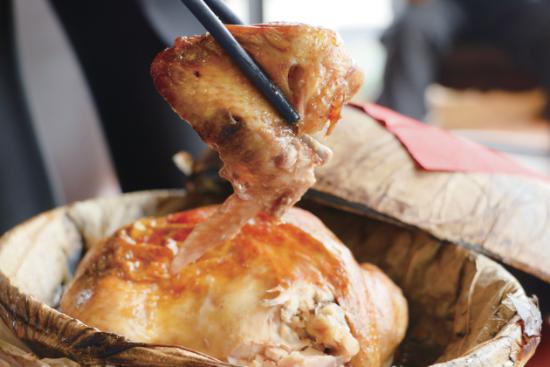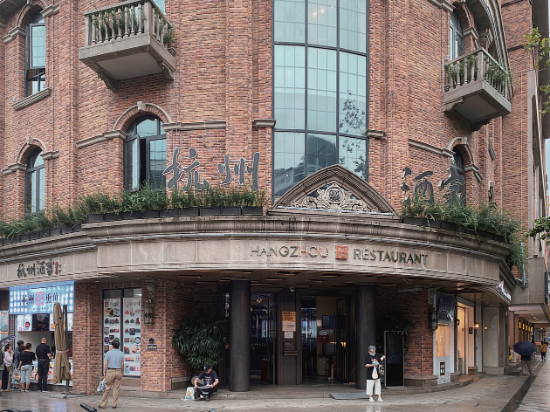Traditional Hangzhou dish: Beggar's chicken

Beggar's chicken at Hangzhou Restaurant, a local restaurant in Hangzhou famous for the dish [Photo/jrsh.hangzhou.com.cn]
Beggar's chicken, also known as clay-wrapped chicken, is a very famous and popular dish in Hangzhou with a history dating back more than 300 years.
For many Chinese, a fictional kung fu master named Hong Qigong from the Legends of Condor Heroes by novelist Louis Cha, who is known by his pen name Jin Yong, is the first thing that comes to mind when somebody mentions the dish, as it is Master Hong's favorite.
Beggar's chicken is a must-try dish at restaurants dedicated to local Hangzhou cuisine. Hangzhou Restaurant is known for having particularly tasty beggar's chicken, wish the dish even being featured at the Hangzhou Dish Museum.
Hangzhou Restaurant, located near West Lake, Hangzhou's most famous scenic area, was formerly known as Gaochangxing Restaurant, founded in 1921. Its beggar's chicken has long been well-respected.
Liu Guoming, general manager of Hangzhou Restaurant, expressed hope that the restaurant would continue gaining popularity.
"Whenever customers come, the restaurant is there waiting for them," he said.

Hangzhou Restaurant, formerly known as Gaochangxing Restaurant, was founded in 1921 and is located near West Lake, the most famous scenic area in Hangzhou, capital of East China's Zhejiang province. [Photo/jrsh.hangzhou.com.cn]
In the 1980s and 1990s, many Hangzhou restaurants dedicated to traditional Hangzhou dishes used cellophane to wrap beggar's chicken to preserve the chicken soup. Liu made some improvements by replacing the cellophane with an iron-made copper, preserving both the shape and taste of the beggar's chicken.
There are many legends surrounding the origin of the dish's name. In one such legend, a beggar caught a chicken but had no utensils or spices to cook it with. He could only wrap it in lotus leaves and packed clay and bake it over a fire. Once the chicken was cooked, he stripped down the clay and found that the chicken meat was very tender and fragrant.
From then on this cooking method has been widely applied and even introduced into restaurants. After constant experiments the original cooking method has developed in to the current one. Cooks carefully select good-quality Yue Chicken which is large, tender, and low-in-fat. Right after the chicken is cleaned and stuffed, it's wrapped in a lotus leaf covered with the mixture of Shaoxing Wine (a cooking wine in Chinese cuisine), and then mud and roasted for hours. With the refreshing scent of wine and lotus leaf penetrating into the chicken, the chicken smells fabulously appetizing.
-
Why Hangzhou is on Nature's cover for the second time in three months
December 16, 2025
-
Hangzhou to build rocket manufacturing base
December 12, 2025
-
Hangzhou reports steady Jan-Oct economic performance
November 26, 2025
-
Global content creators discover Hangzhou's tech magic
December 2, 2025



